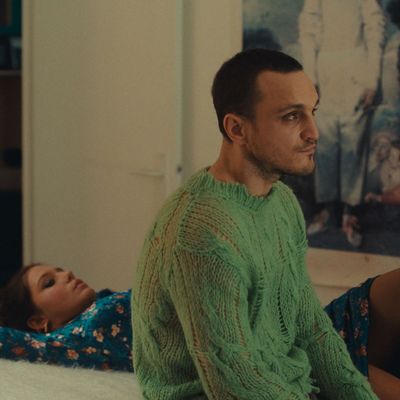
Franz Rogowski isn’t handsome, at least not by the scrupulously symmetrical standards of Hollywood beauty. He’s hot in a way that’s much more interesting. The 37-year-old German actor presents as a set of contradictions with an intimidatingly broad forehead and a crooked nose that looks like it has weathered a few punches and a disarmingly open gaze and a voice softened by a lisp. Rogowski sometimes gets compared to Joaquin Phoenix—the men share an aura of emotional intensity as well as scars on their upper lips—though he has a restless energy that’s very much his own and channels it into performances that are driven by his body as much as that face. In Passages, he plays a director named Tomas who moves through the film’s Parisian interiors like a big cat pacing around a zoo enclosure. The two unfortunates who’ve been cast as his keepers are his husband, Martin (Ben Whishaw), and Agathe (Adèle Exarchopoulos), with whom Tomas strikes up a romance. Martin and Agathe each have the temerity to want a life with the man. That’s something Tomas seems to want, too, until he decides the most basic expectations of a relationship—that he show up, that he tell the truth—are an unfair imposition.
Tomas is the axis around which Passages revolves, but to describe him as the protagonist of this sexy, maddening, too-short movie implies that it aims to probe under his skin rather than gaze at him like a car crash. Passages comes from filmmaker Ira Sachs and feels like a companion piece to hs previous work about toxic relationships, like the Memphis-set Forty Shades of Blue from 2005, in which Dina Korzun plays the neglected Russian girlfriend of Rip Torn’s drunk, philandering music producer, and Keep the Lights On from 2012, a saga about being in love with a person who has an addiction. It’s what makes people stay in these situations that interests Sachs—that Keep the Lights On is semi-autobiographical might explain why—and Passages has two seemingly sensible characters through which to explore these bad decisions. Martin, played by Whishaw with a heartbreaking patience, is a graphic artist who runs a printmaking studio, and whose lovely, grown-up existence includes a cottage in the country and a fetching red robe worn to bed each night. Agathe is a schoolteacher whose bourgeois parents immediately see through Tomas (maybe because he shows up to meet them in a sheer cropped tank top). Their down-to-earth qualities become a kind of explanation—as though, to them, Tomas were an irresistible novelty, pursuing his every impulse as though it were an edict from the gods.
“You know what I was doing last night? I had sex with a woman. Can I tell you about it, please?” Tomas asks Martin after coming home from his film’s wrap party in the morning light. Despite the makeup of its love triangle, Passages isn’t actually a film about polyamory or sexual awakenings—it’s about a bad boyfriend, one who’s able to elide his awfulness under the guise of urban sophistication. Whatever arrangement Tomas and Martin might have in their marriage, it surely doesn’t include the casual cruelty of Tomas’s manipulations; after he asks that question, he throws a tantrum over the lack of excitement he feels in his marriage to Martin, and the scene somehow ends with Martin doing the consoling. Tomas doesn’t move in with Agathe so much as seek refuge with her when Martin reacts less than supportively to his announcement that he’s falling in love and that Martin should be happy for him. When Martin threatens to move on, though, Tomas comes barging back into his life as though he had never left and as though it were unreasonable that his former lover might not see their home as a shared one anymore. Later, on a joint getaway at that little stone vacation house, Agathe listens miserably while Tomas hooks up with Martin in another room and then comes crawling back into her bed to sleep without a word of explanation.
The things that Tomas tries to get away with bring a dark, comic absurdity to Passages, which, at a swift 91 minutes, does feel like it could have stretched on longer and explored the different, hopeless configurations in which these characters could end up. Tomas is the film’s most captivating element as well as its limiting factor because it’s only possible to bear so much time in his company. It’s a testament to Rogowski’s performance that Tomas’s appeal remains apparent despite his behavior, that his gravitational pull is understandable even as you long for the others to escape it. There’s something compelling about the strength of the character’s desires, how easily he pursues what he wants, and how little he thinks about the consequences. He hurls himself into sex so freely that he has a spur-of-the-moment grapple with Agathe in his production offices, the two fumbling over surfaces in a scene that’s all the racier for its awkwardness. Rogowski finds Tomas’s animal allure without softening his selfishness. As one bystander to the romantic drama observes, people like Tomas don’t change—it’s on everyone else to decide when they’ve had enough.
More Movie Reviews
- The Accountant 2 Can Not Be Taken Seriously
- Another Simple Favor Is So Fun, Until It Gets So Dumb
- Errol Morris Has Been Sucked Into the Gaping Maw of True Crime


